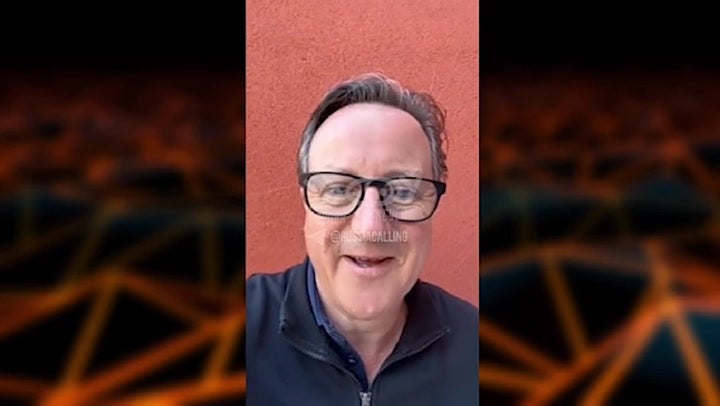Cameron may have been caught out by pranksters – but he has the last laugh
The foreign secretary fell for a fake Russian call – but even when talking about Ukraine and his recent dinner with Donald Trump, he didn’t give away any state secrets, and equipped himself better than other politicians to whom the same thing has happened, says Sean O’Grady


It says a lot for the Conservatives’ election campaign that the best thing that has happened to them since Rishi Sunak did his impression of a drowned rat is that the foreign secretary got scammed by some Russian pranksters.
The hoax call was made by a celebrated double act who go by the names of Vovan and Lexus, Moscow’s answer to Ant and Dec. They somehow got hold of David Cameron’s mobile number and, penetrating Britain’s predictably lax security protocols, got through to him and, using a highly convincing “deepfake” filter, pretended to be the former president of Ukraine, Petro Poroshenko. Cameron then chatted away about Putin, Trump and Macron, mostly about the war in Ukraine.
The bad news is that Cameron got duped by a pair of amateurs who always give the impression that they wouldn’t mind too much if their victims (Cameron is hardly the first) gave away intelligence of value to the Kremlin. It’s not the first time he’s been hoax-called, either.
The much better news is that Cameron behaved impeccably, with only the mildest indiscretions. Asked about what would change if Labour win the election, Cameron the opposition party is as “enthusiastic” about helping Ukraine as the Conservatives had been. He told the bogus Poroshenko only what could be gleaned from the newspapers anyway – that the British aren’t keen on the French plan to send troops to Ukraine, that Trump thinks he can appease Putin, and that he spent some time at dinner with Trump trying to change his mind. We knew that.
Mind you, Cameron didn’t acquit himself quite as well as Tom Tugendhat, the security minister, did when he was snared by the Russian pair in 2021, when they passed themselves off as an ally of Alexei Navalny. As Tugendhat noted at the time: “They got through to me today. They won’t broadcast the bits where I call Putin a murderer and thief.”
Less successful was Boris Johnson, who was similarly hoaxed by Vovan and Lexus in 2018 when he was prime minister. On that occasion, they successfully claimed to be the prime minister of Armenia, a gent not well known to Johnson. Cracking a few gags along the way, Johnson basically behaved himself, perhaps surprisingly, until the point when the Armenian premier suggested Jeremy Corbyn being influenced by Russia, something Johnson could only respond to with a slightly sceptical dry wit: “I’m sure our intelligence will be listening on this line and they will draw the relevant conclusions I’m sure. Thank you very much for that interesting titbit of information.” Or maybe the Kremlin was so puzzled by Corbyn’s stance on the Salisbury poisonings that even they couldn’t work out what he was up to.
In fact, the only mild damage that Vonak and Lexus have ever inflicted on the West was when they lured Giorgia Meloni into admitting a general “fatigue” in the West about the war in Ukraine. Though it was an unhelpful remark made in candour, it is also perfectly apparent in what the opinion pollsters tell us. We are democracies, after all.
So Vonak and Lexus aren’t that great a threat to Western security, and they’re not that amusing either, unless maybe you’re some sort of radicalised Russian nationalist, which admittedly, thanks to his propaganda machine, many of Putin’s people now are.
It’s a shame that we in Britain seem to have lost the comedic art of the hoax call. The late Victor Lewis-Smith used his phone to make some savagely satirical phone calls of people in showbiz; while many of us recall with enthralled affection the activities of Channel 4’s “Fonejacker”, invented by the brilliant Kayvan Novak. The most successful, though it goes back a bit, was when Rory Bremner used an uncanny ability to impersonate Gordon Brown and used it to get Margaret Beckett into slagging off her cabinet colleagues. But it seemed to cross a line. As Beckett said, the wind-ups were “both an unprincipled and unpleasant breach of privacy”. She was right, to be fair, and the phone-hacking scandal and the laws on digital communication have probably deterred home-grown hoax calls for "entertainment".
So did the terrible tragedy of Jacintha Saldanha, a nurse at King Edward VII’s Hospital who was fooled by an Australian radio station into talking about the health of the Duchess of Cambridge in 2012; so traumatised by the publicity and shame was the nurse that she took her own life. That was really when the fun stopped
The truth is that hoax calls are at best an ephemeral distraction from more important things – as Cameron and the Tories are about to discover.



Join our commenting forum
Join thought-provoking conversations, follow other Independent readers and see their replies
Comments